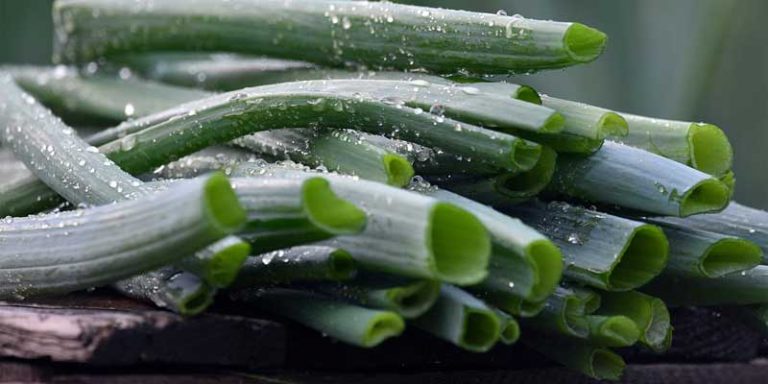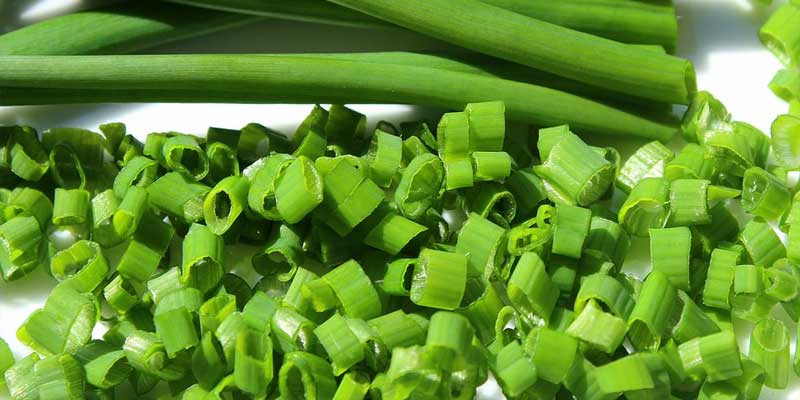Chives is one of those herbs that’s very versatile. It can be used to garnish a salad to make them look more appealing or added to soups and stir-fry to give them an added flavor. Like most other herbs, chives tend to not last very long once it’s harvested from the garden. For best taste, they’ll need to be used right away. What if you want to store them for months?
So can you freeze chives? Yes, you can freeze chives in the freezer. Due to their texture, these herbs freeze very well and will stay fresh for up to 6 months in the freezer. Proper storage is the key to keeping them fresh for a long time in the freezer.
Does Chives Freeze Well?
Like most other herbs, chives tend to freeze well due to their texture. However, this herb tends to lose a lot of its texture when it’s thawed.
For food like potato salad or any dishes that require garnishing, frozen chives will not be a good choice. You’ll end up with soggy and soft chives, which won’t be too appealing.
By freezing chives, it helps them retain their onion flavor. Therefore, for foods that require cooking such as soups and stir-fry, this makes frozen chives a perfect choice.
How to Freeze Chives
Chives can be frozen in several different ways. You can flash freeze them or freeze them as an ice cube. Both method are great for storing chives in the freezer. It will help retain their texture and flavor while it’s stored in the freezer.
Below are the steps for each method to prepare and freeze chives:
Flash Freezing Fresh Chives
- Start by cleaning all the chives that you’ll need to freeze. Run them under cool water for about 10 seconds.
- Once it’s cleaned, leave them in a strainer or colander for about 10 minutes to let it dry drip.
- Use a paper towel, gently dap the chives to remove any excess water. Make sure inside of the chives that it’s dried as well.
- Cut the chives to your desired size. They can be left as whole or cut down to save space in the freezer.
- On a clean tray, lay a sheet of cooking paper or wax paper on it.
- Lay each piece of chive on the tray making sure they are evenly spaced from each other.
- Place the tray into the freezer. Flash freeze them for about 2 to 3 hours.
- Once it’s completely frozen, remove it from the freezer and immediately transfer it to a freezer bag.
- Put just enough where you are able to seal the bag.
- Squeeze out as much air from the bag as you can before sealing it.
- Label the bag with a date and put them back into the freezer.
Freeze Chives in Ice Cube Trays
- Start by cleaning the chives with clean water to remove any dirt and debris.
- On a cutting board, take a sharp knife and slice them into small rings. Alternatively, you can use a pair of scissors to cut them.
- In a clean ice cube tray, place the cut chives into each slot. Fill them with a couple of chives until it reaches halfway.
- Once all the slots are filled, pour water until all the chives are submerged. For added flavors, you can opt to use olive oil instead of water.
- Place the ice cube tray into the freezer and let it sit for a couple of hours.
- Once it’s completely frozen, remove it from the freezer and transfer each ice cube into a freezer bag.
- After the bag is filled, squeeze out as much air as you can and seal the bag tight.
- Label the freezer bag with a date and place it back into the freezer.
Freezing Cooked Chives
If you’ve cooked chives in a meal, freezing is possible. Simply put the entire meal into an airtight container and make sure it’s sealed tightly. Label the container with a date so you’ll know when to finish it.
Cooked chives, whether you’ve cooked them by itself or it’s part of a meal, it can be frozen for about 3 months. For meals like stir-fries, it can be shorter due to the oil being present in the meal. Oil tends to not freeze very well in the freezer.
For other meals such as soups and stews, those can be stored in the freezer just fine. Be sure to store them in an airtight container and consume it within 2 months for the best taste.
How Long Can You Freeze Chives?
Chives will stay fresh in the freezer for about 6 months. This is if you’ve prepped them correctly first and storing them properly. As long as air does not get into the storage bag, chives can last for a long time.
After 6 months, the herbs are no longer fresh but they are still safe to eat and use. The texture and flavor of the frozen chives will start to decrease.
After a year, it’s best to just throw them away or use them in your organic compost. By now, the chives have lost all of its flavors and texture.
How Do You Defrost Chives?
Chives are one of those herbs that don’t need to defrost before you use them. Due to their size and texture, they will almost instantly melt once you remove them from the freezer.
For chives that are frozen as ice cubes, it’s best to use them in a dish like soups and stews. No thawing needed, simply place the ice cube chives into the soup while it’s cooking and it’ll melt away in a few minutes.
If you should want to thaw them, they should be thawed in the refrigerator. Defrosting them in the fridge will allow the chives to thaw slowly without causing damage to the texture or taste.
Can Frozen Chives Go Bad?
Like other herbs, chives tend to go bad quickly once it’s harvested. For frozen chives, it will go bad in two different ways: storing them in the freezer for a prolonged time or when it’s left to thaw for too long.
When it’s in the freezer for too long, it will start going bad. This is mostly caused by the freezer burn on the herbs. With proper storage, chives will stay fresh for up to 6 months. After that, the quality of it will start to diminish. This will usually be the taste and texture of it.
After about a year, chives that are still frozen will no longer be good to eat and should be thrown away. At this point, the texture and taste will pretty much be gone and the frozen chives will just be a piece of ice.
Another way chives can go bad is when it’s thawed. Like most herbs, chives have a thin texture which means it will defrost very quickly. If it’s left to thaw too long, especially at room temperature, it will become soft and mushy.
Therefore, it’s best to use chives straight from the freezer if you can. You can simply toss the frozen chives into the meal while it’s cooking.
Related Questions
Can you freeze chive flowers?
The flowers of the chive plant can be frozen. The flower is edible and can be used in cooked meals and other foods that require that onion taste to it.
Are chives and onion the same?
Their taste shares a similarity, but that’s about it. These two plants are from different species of plants. Both grow in different ways and used differently in the kitchen.


